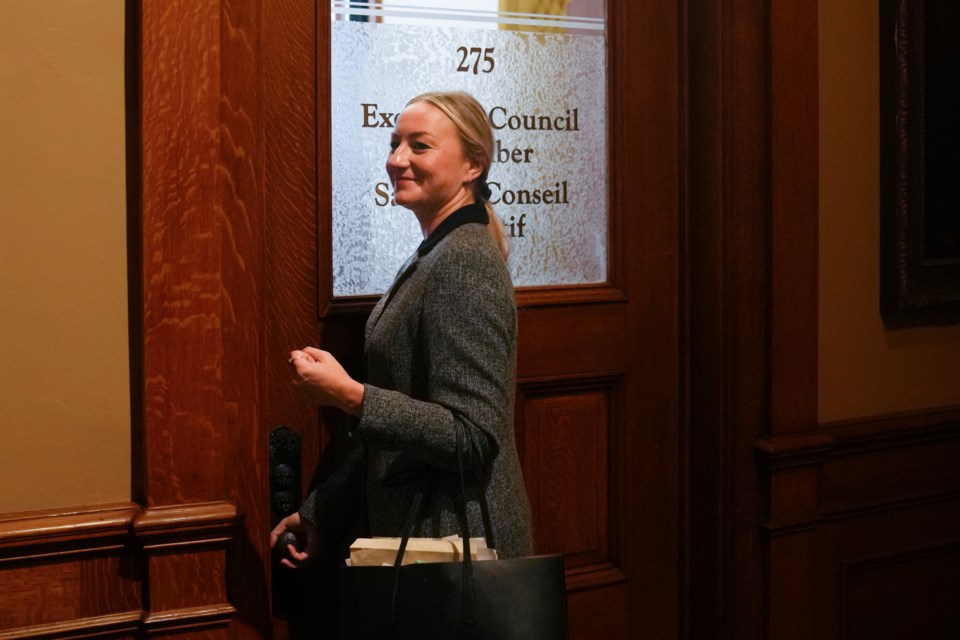In rewriting one of her ministry's essential documents, Ontario's Infrastructure Minister Kinga Surma lent weight to a shift in her priorities now including the province's transit-oriented communities plan.
Earlier this week, Surma proposed changes to her ministry's statement of environmental values that included listing building transit-oriented communities (TOCs), completing Ontario Place's redevelopment, and more ways of managing the province's real estate portfolio as "priorities" to fulfill its mandate.
Alexandru Cioban, a spokesperson for Surma, said in an email that the proposed updates to the statement of environmental values are "primarily to reflect MOI's expanded mandate ... and to highlight ministry initiatives underway."
The Ford government unveiled an early vision of its TOCs plan in its 2019 budget, which stated its aim to "optimize the use of government-owned land and increase transit ridership" by encouraging developers to build mixed-use communities around major transit stations. In 2020, the government passed the Transit-Oriented Communities Act, allowing it to designate areas for TOCs to be built.
Originally a Ministry of Transportation-led initiative — and a focus of Stan Cho's for part of the time he was associate transportation minister — Ford formally transferred to Surma responsibility over TOCs a few months after the June 2022 election. The Ford government has proposed plans for 14 different TOCs across the Greater Toronto Area, most of which are at stations along the Ontario Line, the almost $20-billion 15.6-kilometre subway plan on which early construction began last year.
The TOCs plan has quietly become a major initiative of the Ford government's — and one that's closely monitored by the premier's office. For at least a few months in early 2023, several senior staffers in Ford's office logged biweekly meetings about TOCs with officials from the ministries of infrastructure and municipal affairs and housing, along with others from Infrastructure Ontario and the cabinet office.
According to the Ford government's 2023 budget, by about a year ago it had found "building partners ... for several future" TOCs. For the first time this past year, the government allocated significant spending from the Ministry of Infrastructure's spending plan to go towards building a TOC. In total, it planned $333 million in spending on the East Harbour TOC. The vast majority of this hadn't been spent through three quarters of the fiscal year, however, Ontario's financial accountability officer noted in a recent report.
East Harbour was one of the first TOC locations proposed by the Ford government. A transit hub serving as a stop for Ontario Line and GO trains and Toronto streetcars is planned there. The province has contracted Cadillac Fairview to build the East Harbour TOC. The mixed-use development at the 38-acre site is planned to include thousands of new residential units.
Legislation that Surma introduced last fall and passed with Liberal and Green MPPs' support also seeks to incentivize municipalities to fund new GO stations — which could potentially spur more TOCs.
While the infrastructure minister has long been involved in managing the province's real estate portfolio, Ford assigned Surma "an additional mandate" for provincially owned real estate after the 2022 election as well. A couple of laws the PCs have passed since have given her authority over various kinds of buildings and real estate assets that the province controls.
Surma has been steering the Ford government's planning of the controversial Ontario Place redevelopment over the last few years.
Neither TOCs nor Ontario Place's redevelopment were listed as priorities when former minister Laurie Scott, who remains a PC MPP, last updated the infrastructure ministry's statement of environmental values in 2021. Ontario's Environmental Bill of Rights, passed in 2013, requires each ministry to maintain an environmental values statement. The cabinet member atop each ministry can change its environmental values statement at will. They must first, however, post their statement for 30 days of public consultation, as Surma did on Tuesday.
The Ministry of Infrastructure's existing statement of environmental values, from 2021, mentions the management of provincial real estate assets but to a lesser extent than is included in Surma's proposal. New priorities listed in the rewritten version include "providing effective and efficient management and oversight function for the government's realty portfolio to optimize its value and make best use of realty resources" and "establishing a Centre of Realty Excellence that will help to create a better coordinated approach to decision making around public sector real estate and where possible align with key priorities, including housing and long-term care."




.png;w=120;h=80;mode=crop)